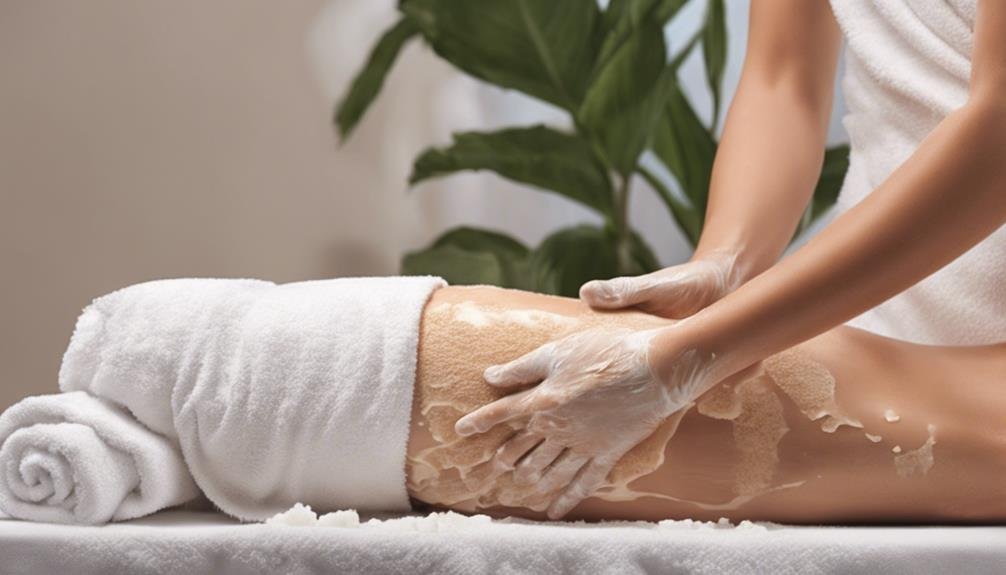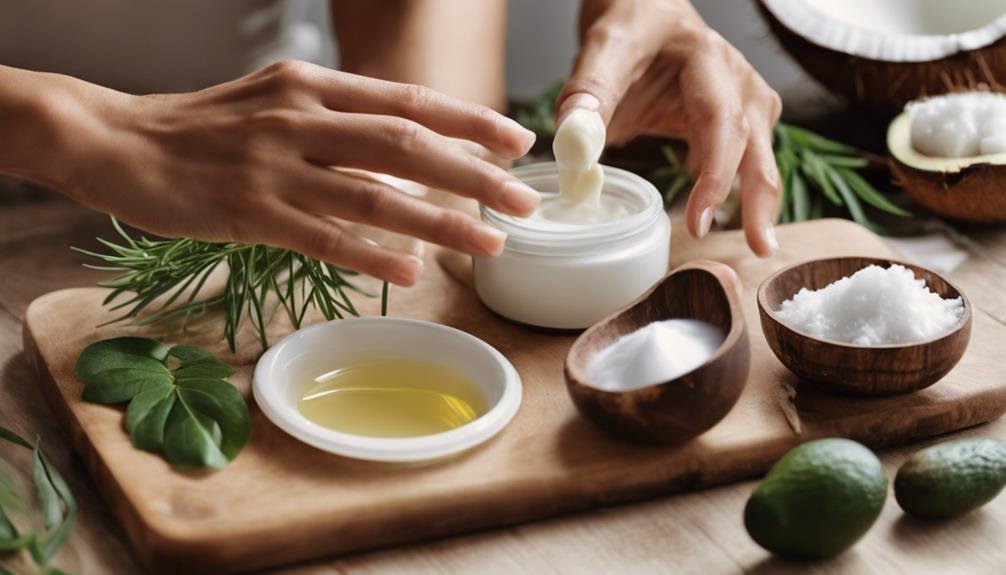"Cherishing Little Steps - A Haven for Baby and Family Journeys"
How to Keep Skin Soft and Supple
Imagine your skin is like a delicate flower that needs constant care and attention to bloom beautifully. You water it regularly, shield it from harsh weather, and nourish it with the right nutrients. Just like that flower, your skin requires a thoughtful skincare routine to stay soft and supple. But how exactly can you achieve this? By following a few simple yet effective steps, you can unlock the secret to maintaining radiant and healthy skin.
Key Takeaways
- Prioritize hydration to maintain soft skin with a radiant look.
- Use moisturizers with hyaluronic acid or glycerin for effective hydration.
- Gentle cleansing and exfoliation reveal fresh, glowing skin.
- Apply sunscreen daily and adopt a healthy lifestyle for skin health.
- Avoid harsh chemicals and consider professional skincare treatments for targeted solutions.
Importance of Hydration

To maintain soft and supple skin, it's essential to prioritize hydration. Water is crucial for skin health as it helps maintain the skin's natural moisture balance, preventing dryness and promoting elasticity. Research has shown that adequate hydration can improve skin texture and overall appearance. When your skin is well-hydrated, it looks plump, smooth, and radiant.
One of the most effective ways to hydrate your skin is by using a moisturizer that contains ingredients like hyaluronic acid, glycerin, or ceramides. These components help attract and retain moisture in the skin, keeping it hydrated throughout the day. Additionally, drinking plenty of water is essential for hydrating your skin from the inside out.
Incorporating hydrating serums or facial mists into your skincare routine can also provide an extra boost of moisture. Remember, hydrating your skin isn't just a one-time effort but a continuous process that requires daily attention and care. By prioritizing hydration, you can help keep your skin soft, supple, and healthy.
Gentle Cleansing Techniques
Gentle cleansing techniques play a crucial role in maintaining the health and vitality of your skin. When cleansing your skin, opt for a mild, non-abrasive cleanser that suits your skin type. Avoid harsh soaps or scrubs that can strip away natural oils and disrupt the skin's barrier. Use lukewarm water instead of hot water, as hot water can be drying and irritating to the skin.
When washing your face, gently massage the cleanser onto your skin using circular motions. Be sure to rinse thoroughly to remove all traces of the cleanser. After cleansing, pat your skin dry with a soft towel instead of rubbing, which can cause unnecessary friction and irritation.
It's important to cleanse your skin twice a day, in the morning and evening, to remove dirt, oil, and impurities that can accumulate throughout the day. By incorporating gentle cleansing techniques into your skincare routine, you can help keep your skin soft, supple, and radiant.
Exfoliation for Renewed Skin

How can you achieve renewed and vibrant skin? Exfoliation is the key. By gently removing dead skin cells, you reveal fresh, glowing skin underneath. Regular exfoliation can help improve skin texture, unclog pores, and promote better absorption of skincare products.
There are two main types of exfoliation: physical and chemical. Physical exfoliants use small grains or brushes to manually scrub away dead skin, while chemical exfoliants use acids like alpha hydroxy acids (AHAs) or beta hydroxy acids (BHAs) to dissolve dead skin cells.
When exfoliating, it's essential to choose products suitable for your skin type and to exfoliate no more than 2-3 times a week to avoid irritation. Be gentle and avoid harsh scrubbing motions that can damage the skin. Remember to follow up with a hydrating moisturizer to keep your skin nourished and protected after exfoliation. With a consistent exfoliation routine, you can achieve a smoother, more radiant complexion.
Nourish With Moisturizers
Nourishing your skin with the right moisturizers is crucial for maintaining its softness and suppleness. Choosing a moisturizer that suits your skin type and concerns is essential. Look for ingredients like hyaluronic acid, glycerin, and shea butter for deep hydration and skin barrier repair. These ingredients help lock in moisture, preventing dryness and maintaining a healthy glow.
When applying moisturizer, remember to do so on damp skin to seal in moisture effectively. Use gentle, upward strokes to promote circulation and absorption.
For daytime, opt for a lightweight, non-comedogenic moisturizer with added SPF protection to shield your skin from harmful UV rays.
At night, consider a richer cream that can work its magic while you sleep, aiding in cell regeneration and repair.
Consistency is key when it comes to moisturizing. Make it a daily ritual, both morning and night, to keep your skin hydrated and plump. By nourishing your skin with the right moisturizers, you can help it stay soft, supple, and radiant.
Sun Protection Strategies

To maintain the health and youthfulness of your skin, it's imperative to implement effective sun protection strategies. The sun's harmful UV rays can accelerate skin aging and increase the risk of skin cancer. Here are some essential strategies to protect your skin:
- Apply sunscreen daily: Choose a broad-spectrum sunscreen with SPF 30 or higher and reapply every two hours, especially when outdoors.
- Seek shade: Limit your time in direct sunlight, especially between 10 a.m. and 4 p.m. when the sun's rays are strongest.
- Wear protective clothing: Opt for tightly woven clothing, wide-brimmed hats, and sunglasses to shield your skin and eyes from UV exposure.
- Avoid indoor tanning: Tanning beds emit harmful UV radiation that can damage your skin and increase the risk of skin cancer.
Benefits of Antioxidants
Antioxidants play a crucial role in maintaining skin health by neutralizing free radicals that contribute to skin damage and aging. These powerful compounds can be found in various foods and skincare products, offering numerous benefits for your skin. By combating oxidative stress, antioxidants help protect your skin from environmental aggressors like pollution and UV radiation. Vitamins C and E, as well as compounds like polyphenols and flavonoids, are common antioxidants known for their skin-protective properties.
Including antioxidant-rich foods in your diet, such as berries, nuts, green tea, and dark chocolate, can help improve your skin's overall health and appearance. Additionally, using skincare products containing antioxidants can provide added protection and support for your skin. Look for serums, moisturizers, and masks formulated with ingredients like vitamin C, retinol, and green tea extract to harness the benefits of antioxidants for your skin.
Sleep for Skin Health

Ensuring you get an adequate amount of quality sleep is essential for maintaining healthy skin. Sleep plays a crucial role in skin health and overall well-being. Here are some reasons why prioritizing sleep can lead to soft and supple skin:
- Repair and Regenerate: During deep sleep, the body repairs and regenerates tissues, including the skin. This process helps in maintaining skin elasticity and firmness.
- Collagen Production: Adequate sleep promotes collagen production, a protein crucial for skin strength and elasticity. Collagen helps reduce the appearance of wrinkles and fine lines.
- Hydration Balance: Lack of sleep can disrupt the skin's moisture balance, leading to dryness and dullness. Sufficient sleep allows the skin to maintain optimal hydration levels.
- Inflammation Reduction: Quality sleep helps in reducing inflammation in the body, which can prevent skin conditions like acne and psoriasis.
Stress Management Tips
Amidst the hustle and bustle of daily life, managing stress effectively is crucial for both mental well-being and skin health. High stress levels can trigger inflammation in the skin, leading to various issues like acne breakouts, eczema flare-ups, and premature aging. To help you maintain a healthy balance, here are some stress management tips:
| Stress Management Tips | Description | Effect on Skin |
|---|---|---|
| Practice Mindfulness | Engage in mindfulness exercises like meditation or deep breathing to reduce stress levels. | Decreases inflammation and promotes a clear complexion. |
| Exercise Regularly | Regular physical activity releases endorphins, which are natural mood lifters. | Boosts circulation, delivering more oxygen and nutrients to the skin. |
| Establish Boundaries | Learn to say no and set boundaries to avoid overcommitting and overwhelming yourself. | Reduces stress-related skin issues like breakouts and dullness. |
Healthy Diet Choices

For optimal skin health and overall well-being, maintaining a balanced and nutritious diet is essential. Your skin reflects what you eat, so nourishing it from the inside out is key to achieving that soft and supple glow you desire.
Here are some healthy diet choices to incorporate into your daily routine:
- Hydrate: Drink plenty of water throughout the day to keep your skin hydrated and flush out toxins. Aim for at least 8 glasses daily.
- Eat Antioxidant-Rich Foods: Include colorful fruits and vegetables like berries, spinach, and carrots in your meals. Antioxidants help protect your skin from damage and keep it looking youthful.
- Omega-3 Fatty Acids: Incorporate sources of omega-3s such as salmon, chia seeds, and walnuts into your diet. These healthy fats help maintain skin elasticity and hydration.
- Protein-Rich Foods: Opt for lean proteins like chicken, tofu, and legumes. Protein is essential for collagen production, which supports skin structure and firmness.
Exercise for Skin Circulation
To maintain that radiant complexion and promote skin health, incorporating regular exercise into your routine is vital. Exercise plays a crucial role in improving circulation, which is essential for delivering oxygen and nutrients to your skin cells while removing toxins.
When you engage in physical activity, your heart rate increases, pumping more blood throughout your body, including your skin. This increased blood flow nourishes your skin cells, helping them regenerate and repair more effectively. Additionally, exercise promotes the production of collagen, a protein that maintains skin elasticity and firmness, reducing the appearance of wrinkles and sagging.
Incorporating a variety of exercises into your routine, such as cardio, strength training, and flexibility exercises, can benefit your skin health. Aim for at least 30 minutes of moderate physical activity most days of the week to experience the skin-enhancing effects of exercise. Remember to stay hydrated and cleanse your skin post-workout to remove any sweat and debris that could clog pores and hinder your skin's radiance.
Avoid Harsh Chemicals

When it comes to maintaining skin health and preserving its natural balance, one crucial aspect to consider is the avoidance of harsh chemicals in your skincare products. Your skin is a delicate organ that can easily be irritated or damaged by the wrong ingredients.
Here are some reasons why steering clear of harsh chemicals is essential for keeping your skin soft and supple:
- Sensitivity: Harsh chemicals can strip your skin of its natural oils, leading to dryness and irritation.
- Allergies: Some chemicals can trigger allergic reactions, causing redness, itching, or even more severe skin issues.
- Long-term Damage: Continual exposure to harsh chemicals can cause long-term damage to your skin barrier, making it more vulnerable to environmental stressors.
- Natural Balance Disruption: Harsh chemicals can disrupt the natural pH and microbiome of your skin, leading to imbalances and potential breakouts.
Professional Skincare Treatments
Professional skincare treatments offer a targeted and specialized approach to addressing various skin concerns and achieving optimal skin health. These treatments are performed by licensed skincare professionals who are trained to assess your skin's specific needs and provide customized solutions. From facials and chemical peels to microdermabrasion and laser therapy, professional treatments can help improve skin tone, texture, and overall appearance.
One popular professional treatment is the HydraFacial, which combines cleansing, exfoliation, extraction, hydration, and antioxidant protection in a single session. This treatment is gentle yet effective in rejuvenating the skin and promoting a healthy glow.
Another beneficial option is microneedling, a procedure that stimulates collagen production and enhances the absorption of skincare products for smoother and firmer skin.
It's important to consult with a skincare professional to determine the best treatment plan for your skin type and concerns. Regular professional treatments can complement your at-home skincare routine and help you achieve lasting results.
Frequently Asked Questions
Can Certain Fabrics Affect Skin Softness?
Certain fabrics can indeed affect skin softness. Fabrics like cotton and silk are gentle on your skin, helping maintain its softness. In contrast, rough fabrics like wool or polyester may cause irritation and dryness.
Is There a Link Between Hydration and Skin Elasticity?
Wondering if hydration impacts skin elasticity? Well, it does! Hydrated skin appears more supple and resilient. Drinking water, using moisturizers, and maintaining a balanced diet can help maintain skin's elasticity and youthful appearance.
How Does Stress Impact Skin's Texture?
When stress levels rise, your body releases cortisol, impacting skin texture. This hormone can lead to decreased collagen production, making skin appear dull and aged. Practicing stress management techniques can help maintain healthy, supple skin.
Can Vitamins Improve Skin's Suppleness?
Taking vitamins can enhance your skin's suppleness by providing essential nutrients. Vitamins like A, C, and E promote collagen production, improve elasticity, and protect against damage. Consult with a dermatologist to determine the best supplement regimen for you.
Does Water Temperature Affect Skin Hydration?
Hot water can strip skin of natural oils, leading to dehydration. Cold water can constrict blood vessels, reducing nutrient flow. Warm water is ideal for maintaining skin hydration by opening pores and promoting better absorption of moisture.
Conclusion
In conclusion, by prioritizing hydration, gentle cleansing, exfoliation, and nourishing your skin with moisturizers, you can achieve a soft and supple complexion. Think of your skin as a delicate flower that needs care and attention to bloom. Remember to protect it from harmful UV rays, maintain a healthy diet, and avoid harsh chemicals. By following these steps, you can achieve glowing, radiant skin that feels smooth and velvety to the touch.

